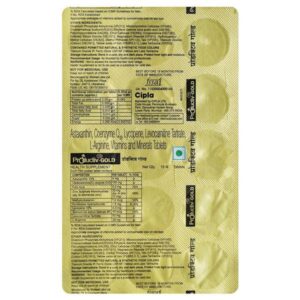ANTIOXIDANTS + MULTIVITAMINS + MULTIMINERALS
Antioxidants: Antioxidants are substances that help protect the body’s cells from damage caused by free radicals. Free radicals are unstable molecules that can cause oxidative stress and damage to cells, which may contribute to various health problems, including chronic diseases like heart disease and cancer.
The use of antioxidants includes both dietary sources as well as supplementation. Antioxidants are commonly found in fruits, vegetables, nuts, and grains, such as vitamin C, vitamin E, carotenoids, and flavonoids. In supplement form, antioxidants are available as individual vitamins and minerals or in combination formulations.
The mechanism of action of antioxidants is primarily based on their ability to neutralize free radicals. Free radicals are molecules with unpaired electrons that are highly reactive and can cause cellular damage. Antioxidants can donate an electron to free radicals, neutralizing them and preventing further damage to cells. This process helps to maintain the balance between the production of free radicals and the body’s antioxidant defense system.
The dose of antioxidants varies depending on the specific antioxidant being used and the form of supplementation. It is important to follow the recommended dosage instructions provided by the manufacturer or consult with a healthcare professional for guidance.
While antioxidants are generally well-tolerated, some potential side effects may occur. These include gastrointestinal disturbances, such as upset stomach or diarrhea, especially when high doses are consumed. In certain cases, excessive intake of some antioxidants, particularly through supplements, may have adverse effects. For example, high doses of vitamin E have been linked to an increased risk of bleeding and should be used with caution in individuals taking blood-thinning medications.
It is important to note that supplementation with antioxidants should not be seen as a substitute for a balanced diet rich in fruits and vegetables. As with any supplement, it is recommended to consult with a healthcare professional before starting antioxidant supplementation, especially if you have any underlying medical conditions or are taking other medications.
Multivitamins: Multivitamins are a type of dietary supplement that contains a combination of vitamins and minerals. They are commonly used to provide a range of essential nutrients that may be lacking in a person’s diet. Multivitamins can be beneficial for individuals who have inadequate intake of vitamins and minerals due to dietary restrictions, poor appetite, or certain medical conditions.
The mechanism of action of multivitamins involves supplementation of essential vitamins and minerals, which play vital roles in various bodily functions. These nutrients are necessary for growth, development, metabolism, and overall health. Multivitamins help fill in nutritional gaps and support the body’s proper functioning.
The dose of multivitamins can vary depending on the specific brand and formulation. It is important to follow the instructions provided on the product labeling or consult with a healthcare professional for personalized recommendations. Typically, multivitamins are taken orally with a glass of water.
Side effects of multivitamins are generally rare and mild. Common side effects may include gastrointestinal symptoms such as upset stomach, nausea, or diarrhea. In some cases, individuals may experience allergic reactions to certain vitamins or minerals present in the supplement. Overdosing on specific nutrients can also lead to adverse effects, so it is important not to exceed the recommended dosage.
It is worth noting that multivitamins are not intended to replace a balanced diet or be used as a substitute for healthy eating habits. They should be used in conjunction with a well-rounded diet to ensure optimal nutrient intake. Additionally, it is important to inform healthcare professionals about any other medications or supplements being taken, as certain interactions may occur.
Multiminerals: Multiminerals is a supplement that contains a combination of essential minerals required by the body for optimal functioning. It is used to replenish or maintain the mineral levels in the body when these minerals cannot be obtained through the diet alone.
The mechanism of action of Multiminerals is based on the fact that minerals play crucial roles in various bodily processes. They are required for the proper functioning of enzymes, maintenance of fluid balance, bone strength, nerve transmission, and muscle contraction. Multiminerals provide a balanced blend of minerals such as calcium, magnesium, iron, zinc, and copper, among others, to ensure that the body has an adequate supply.
The dose of Multiminerals depends on the specific brand and formulation. It is commonly available in tablet or capsule form and is usually taken orally with water. It is important to follow the instructions on the product label or consult a healthcare professional to determine the appropriate dosage.
Multiminerals are generally safe when taken as directed. However, like any medication, they may cause some side effects. Common side effects include gastrointestinal discomfort, such as nausea, stomach upset, or constipation. In some cases, individuals may experience allergic reactions or hypersensitivity to certain minerals in the supplement. If any unusual or severe side effects occur, it is important to seek medical attention promptly.
It is worth noting that certain medications or medical conditions may interact with Multiminerals, so it is crucial to inform your healthcare provider about any other medications or health conditions before starting this supplement. Additionally, Multiminerals should not be used as a substitute for a balanced diet, and it is always advisable to try to obtain essential minerals from a varied and nutritious diet whenever possible.
Overall, Multiminerals serve as a convenient and effective way to supplement the body’s mineral requirements. However, it is important to use them as directed, monitor for any potential side effects, and seek medical advice if needed.

